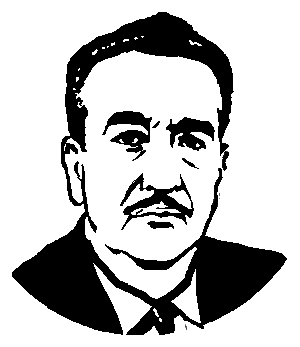Khalid Bakdash facts for kids
Quick facts for kids
Khalid Bakdash
|
|
|---|---|
 |
|
| Personal details | |
| Born | 1912 Damascus, Ottoman Syria |
| Died | July 15, 1995 (aged 82–83) Damascus, Syria |
| Occupation | Secretary-general of the Syrian Communist Party Member of the Parliament of Syria |
Khalid Bakdash (1912 – July 15, 1995) was an important Syrian politician. He led the Syrian Communist Party (SCP) for a long time, from 1936 until he passed away in 1995. In 1954, Bakdash made history. He became the first person from a communist party to be elected to a parliament in an Arab country. Because of this, he is often called the "dean of Arab communism," meaning he was a very respected and experienced leader in the Arab communist movement.
Contents
Early Life and Education
Khalid Bakdash was born in a Kurdish neighborhood in Damascus, Syria. His family was Syrian-Kurdish. He became interested in communism when he was 18 years old. At that time, he was a student at Damascus University.
Bakdash was active in student protests against the French control of Syria. The police noticed his activities. In 1933, his party decided it would be safer for him to leave the country. So, in 1934, he went to Moscow and studied at the Communist University of the Toilers of the East. While he was there, Bakdash translated an important book called The Communist Manifesto into Arabic for the first time.
Leading the Syrian Communist Party
Bakdash returned to Syria in 1936. He then took charge of the Communist Party of Syria and Lebanon as its secretary. He kept this leadership role for the rest of his life. During World War II, he led the Syrian underground movement against Vichy France. This was when the Vichy government controlled Syria.
In 1942, Syria came under the control of the Allied forces. The French government promised Syria independence and made the Communist Party legal. Before this, the party had been banned.
As the party's secretary, Bakdash chose a careful and balanced approach. In 1944, he wrote the party's rules and plans. These showed that the party wanted to fit into the political situation of the Arab world. They focused on fighting against colonial rule. Bakdash wanted the party to be a big, democratic movement. He did not want it to be a small, strict group following only Leninist ideas.
Even though Bakdash is called the "elder statesman" of Arab communism, his influence on other Arab communist parties was not always huge. For example, he had a difficult relationship with Fahd. Fahd was the leader of the Iraqi Communist Party from 1941 to 1949. In the 1940s, Bakdash supported the Iraqi People's Party. This party tried to build a broad movement focused on national issues, similar to the Syrian Communist Party. Fahd's party, however, followed a stricter communist path.
First Communist in an Arab Parliament
In 1954, Bakdash won a seat in the Syrian Parliament. This was a big achievement. During Syria's changing democratic period from 1954 to 1958, he guided his party carefully. A major challenge for him was the idea of Arab unity. This especially meant uniting with Gamal Abdel Nasser's Egypt. Bakdash was very critical of Nasser. This was because Nasser started to crack down on his political opponents, including communists and the Muslim Brotherhood. Nasser did not believe in having many different political parties, so he banned them.
However, many people supported unity with Egypt. This forced Bakdash to adapt. Some historians believe he might have known about, or even approved of, a communist general joining the Syrian group that convinced Gamal Abdel Nasser to create the United Arab Republic. This republic united Syria with Egypt in 1958. But Bakdash later criticized Nasser's policies in December 1958. He asked for political parties to be legal again and for the UAR to become a looser union. This led to a strong crackdown on the Communist Party. Bakdash himself left Syria and stayed in Moscow until 1966.
Syria left the UAR in 1961. Important groups in the army and among business people, as well as the communists, supported this decision. But the separation was very controversial. The parties that supported it lost a lot of public support. The Syrian Communist Party shrank to only a few hundred members.
Party Leadership Under Ba'athist Rule
On March 8, 1963, a coup took place. Supporters of reuniting with Egypt, mainly Ba'athists, Nasserists, and the Arab Nationalist Movement, took power. This ended the government that supported separation. However, reunification never happened. From then until the 1970s, the Communist Party faced repression.
In 1966, a secret military group within the Syrian Ba'ath Party took control. They followed a far-left political path. Bakdash was allowed to return from Moscow. But he was not allowed to take part in public political activities. After Hafez al-Assad came to power in Syria in 1970, he said he wanted to bring back political diversity. This happened through the National Progressive Front. This was a group of parties that supported the government's Arab nationalist and socialist goals. They also accepted the leadership of the Ba'ath Party. Bakdash had to choose between joining this front or operating illegally. He chose to join. A small group of radicals, led by Riyad al-Turk, later left the party to oppose the government.
In 1986, there was a disagreement between Bakdash and his deputy, Yusuf Faisal. This led to a split in the party. Faisal supported the new policies of perestroika (restructuring) and glasnost (openness) that Soviet leader Mikhail Gorbachev was introducing. Bakdash was against these changes. Many of the party's educated members left with Faisal. But Bakdash kept the support of the party's large Kurdish base.
Khalid Bakdash passed away in Damascus in 1995. He was 83 years old. His wife, Wisal Farha Bakdash, took over as the party secretary after his death.
See also
 In Spanish: Khalid Bakdash para niños
In Spanish: Khalid Bakdash para niños

